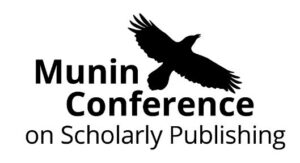Tromsø is the largest urban area in Northern Norway and the third largest north of the Arctic Circle anywhere in the world. Tromsø is known for being the departure city for artic expeditions, Sami population, reindeer and northern lights and for being the most northern university of the world. But it is also known for the annual MUNIN conference on scholarly publishing that usually takes place in the last months of the year. The 17th Munin Conference on Scholarly Publishing took place between 29th of November and the 1st of December 2022 at the The Arctic University of Norway | UiT. The theme of this year was Connecting the building blocks of Open Science. What is necessary for a better connection between them: technical innovations, changes in workflows, changes in research culture? n them: technical innovations, changes in workflows, changes in research culture?
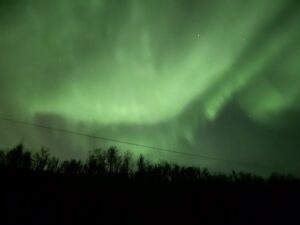
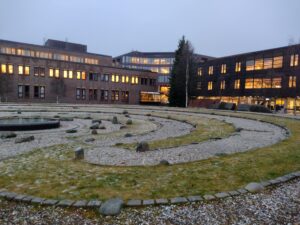
Current situation
At TU Delft, we have an open science program that have been running since 2020 which include Open Access, Open Education, Open Data and Open Publishing. Within this program, we are working on Connecting Open Data to Open Access Publishing. We were looking forward to interacting with at the attendees, to exchange, to learn and trigger collaboration. During the conference we presented a poster, designed by Emilie Yane-Lopes, about this topic and learned a few relevant things.
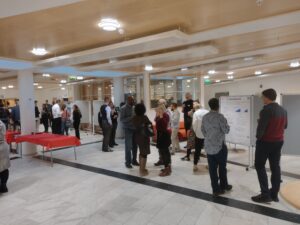
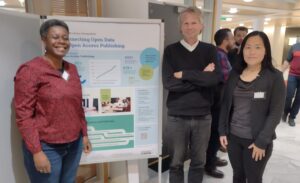
Challenges
- While discussing and presenting our poster and our ideas with the participants a few interesting things were brought to our attention.
Open Data and FAIR Data: what is the difference? It seems that many in our targeted audience cannot make the difference. - Data Management Plan (DMP): How important is a DMP for a researcher or for the institution? Making mandatory requirements can be very counterproductive as those requirements are considered a pain for most researchers. The unpleasant reality is encouraging data management training for undergraduates and master students is harder than for PhDs.
- Training (or education?) Basic training and disciplinary specific training are needed for the researchers but also for those providing training. It is acknowledged that the wide range of skills required to provide support cannot be met by one individual only. As a result, there is a lack of standard certification as there is no professional training for people who provide the support and there are not enough best practices or guides available.
- Connecting library (or institution) services such as research data services and research support with each other.
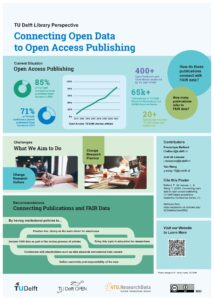
Recommendations & take aways
- Provide a clear definition of open and FAIR data (even if redundant). Open data is about making data freely available, while FAIR data is about making data findable, accessible, interoperable and reusable to a wide range of users and purposes.
- Recognise all efforts and contributions related to data management in a transparent manner
- Invest in researcher engagement through awareness, (specific) trainings and open skills (Kvale 2022). Not focusing on researchers depositing their data in a repository might be the best option and could potentially provide a better outcome. Researchers prefer to deposit their data in repository because that is relevant to their communities. To reach that goal would be a change of research culture and their practices. Enabling communities such as the data champions (see TU Delft example) or RDM professional network, e.g. 4TU.ResearchData community to provide expertise and develop best practises should be considered.
- Interlinked and integrated research support services (Ikonen, A. 2022)
a. A dedicated DMP tool is in development
b. Try to automate the connection between research indexing and repository and the publication
c. The idea of having systematic process is great but we can’t be sure about researcher engagement and collaboration among service teams - Pierre Mounier keynote interactive discussion on Open knowledge offered an ecosystem was very enlightening and can be summarised in three points.
a. Connecting systems:
i. Interoperability (open infrastructure): standards, licences, PIDs, APIs.
ii. Consistent tools for researchers.
b. Connecting people
i. Policy alignment.
ii. Rewards &Recognition for different roles in academia, awareness among stakeholders about each other’s work TUD Data Stewardship advocates open and team science, and has been working on raising awareness in research communities on diverse types of research contribution.
iii. Community is not a given, but requires proactive efforts.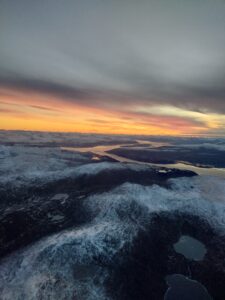
The beauty of Norway by Just de Leeuwe c. Connecting episteme
i. Open environment is needed for knowledge creation, not only researchers create knowledge.
ii. Knowledge exchange should be an open dialogue, while listening to others.
Future work in relation to our poster: use the power of students
- We will review a set of TU Delft Open Access publications during 2020 – 2022 from three TU Delft faculties. This is scheduled March-July 2023
- Identify and categorize current practices of connecting FAIR data and peer-reviewed Open Access publications
- We will report on qualitative and quantitative insights into the subject examined
References
Kvale, L., Bochynska, A., Sarre, A., Stangeland, E., Ostrop, J., Hasle Enerstvedt, K. ., Bertheussen, L., Pharo, N., Sundstøl, S., & Strandskog Arnesen, S. . (2022). Competency Framework for research data services in Norwegian libraries. Septentrio Conference Series, (1). https://doi.org/10.7557/5.6657
Ikonen, A. (2022). Interlinked and integrated research support services . Septentrio Conference Series, (1). https://doi.org/10.7557/5.6649
Digital Scholarship Centre (similar initiative as Leiden’s digital scholarship, good inspiration for TUD)

